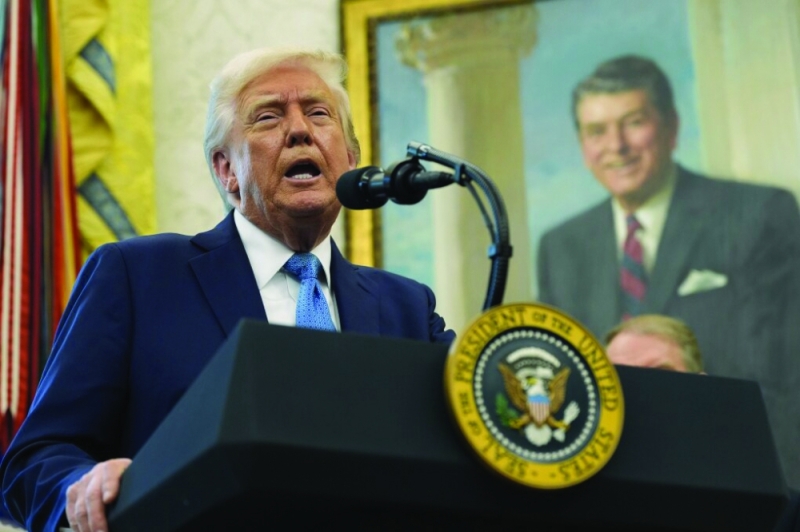Trump plans major shutdown of US-African embassies
Lewanika Timothy | Monday April 28, 2025 16:04


Most of the targeted embassies for shutdown are in war-torn African countries which may threaten to plunge these countries into political unrest. According to memos leaked to international media outlets, Donald Trump’s administration plans to shut down more than 15 embassies and consulates in an effort to cut the cost of running the federal government.
Trump’s plan to close embassies around the world is part of a broader push to slash the US federal budget, spearheaded by a new government efficiency office overseen by Elon Musk.
Amongst the embassies earmarked for closure are those in the Central African Republic, Congo, Eritrea, Gambia, Lesotho and South Sudan. The consulates in Douala (Cameroon) and Durban (South Africa) are also on the hit list.
It is not surprising to see South Africa on the list because it has been a political target of the United States of America since its declared stance to stand with Palestine amid the war between Hamas and Israel.
Last year, a group of US policymakers in Washington bellowed strong objections against South Africa’s one-leg-in, one-leg-out tactics in international relations accusing the latter of “undermining US national security” in a bipartisan Bill that was presented to Congress.
The Bill being a dossier seeking to review South Africa’s trade relations with the US following the former’s darling relationship with America’s rivals, Russia and China.
“The actions of the African National Congress (ANC), which since 1994 has held a governing majority and controlled South Africa’s Executive branch, are inconsistent with its publicly stated policy of non-alignment in international affairs,” the Bill reads.
“In contrast to its stated stance of non-alignment, the South African government has a history of siding with malign actors, including Hamas, a US-designated foreign terrorist organisation and a proxy of the Iranian regime, and continues to pursue closer ties with the People’s Republic of China (PRC) and the Russian Federation,” it added.
Notably, there has been a surge in anti-US and anti-West rhetoric in the ANC and sometimes in parts of South Africa’s government since Russia’s invasion of Ukraine, despite South Africa’s claimed neutral stance on the war.
The growing voice of South Africa’s sentiments has surely been disturbing for the US and other Western partners of South Africa because of its status as an influential democracy in the developing world, and as Africa’s most developed economy.
The return of Trump to office has not made things any easier with Trump accusing South Africa of racial injustices, threatening to cut off all forms of aid and trade to South Africa, something that has strained diplomatic tensions between Washington and Pretoria.
The proposal to cut off embassies is one of a larger strategy to reorganise the State Department, slash its budget by almost 50%, and lower US foreign aid by about 75%. The State Department is an executive department of the US federal government responsible for the country's foreign policy and relations.
The plan, which has raised alarm amongst policymakers and foreign diplomats, is likely to dramatically change the US presence in the world.
The proposed closures, outlined in an internal State Department document, involve diplomatic missions in well-established and lesser-known regions, with a particular emphasis on Africa and Europe.
Behind the scenes, the drive to downsize reflects intense ideological and political pressures. Senior White House officials have decried the State Department as “bloated” and resistant to President Trump’s priorities, prompting a reorganisation blueprint overseen by a loyalist working group.
Secretary of State Marco Rubio, while publicly framing the changes as efficiency measures, has faced internal dissent as career diplomats warn that loyalty tests and merit‐based programme cuts could cripple institutional expertise and morale.
Compounding the structural overhaul, the administration’s fiscal 2026 budget proposal seeks to slash the State Department’s funding by more than $30 billion—nearly 50%—and cut foreign aid by 75%.
Such deep reductions would force a pivot from comprehensive development and democracy programmes toward narrowly defined security and commercial objectives, effectively sidelining long‐standing US commitments in areas like human rights advocacy, climate resilience, and health infrastructure.
Some of the targeted embassies for closure have served as hubs for counter-terrorism coordination, peace-building initiatives, and humanitarian aid delivery. Their closure would compel Washington to rely on distant regional offices or third‐party missions, delaying critical services such as visa issuance and emergency evacuations.
Dismantling resident diplomatic teams could undermine cooperation against Islamist militants and transnational crime networks.
The US has cultivated vital intelligence‐sharing and joint‐training partnerships with African militaries to counter threats from groups like Boko Haram and al-Shabaab; severing these on-the-ground ties risks creating operational blind spots and ceding initiative to competitors.
In the Red Sea corridor, for instance, the planned closure of the Asmara embassy would complicate naval and counterterrorism coordination in a region increasingly contested by Russian and Chinese naval deployments.
Public health experts likewise caution that the cuts could unravel critical disease‐surveillance networks and disrupt PEPFAR, the U.S. HIV/AIDS initiative credited with saving over 20 million lives in Africa.
Without in-country staff to manage outbreak responses and liaise with local health ministries, Washington’s ability to detect and contain emerging pathogens—from Ebola to Lassa fever—would be severely hampered, potentially heightening the risk of future pandemics at a far greater cost than the short-term budget savings.
For many pan-Africanists the move by Washington to scale down diplomatic presence in Africa represents a long announced need for Africans to focus on building a stronger continental tie instead of focusing on aid from western countries.
